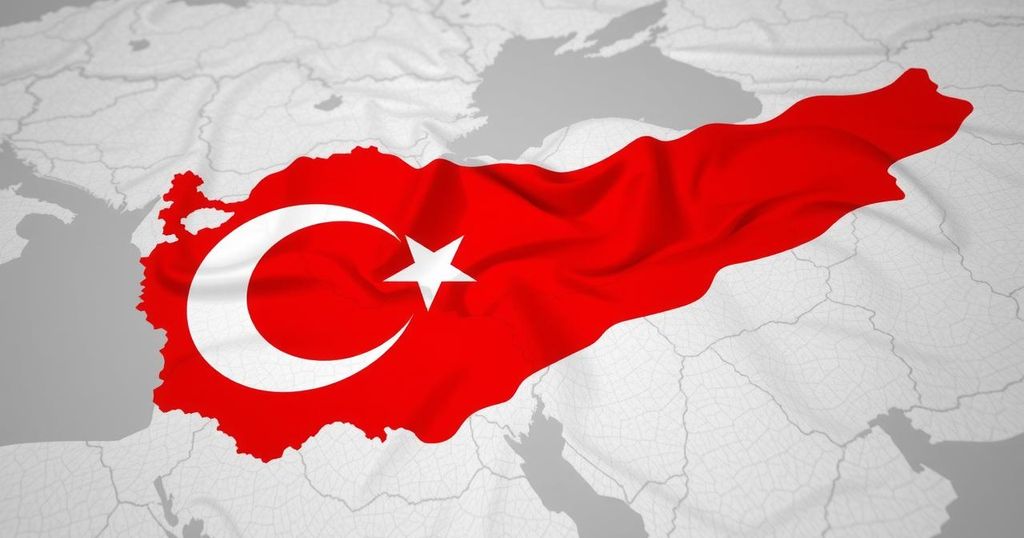Turkey’s Strategic Positioning and Future Prospects in a Post-Assad Syria

Turkey has emerged as a key player in the changing dynamics of Syria following the swift downfall of Assad’s government. Initially permitting limited operations by aligned groups, Turkey’s involvement escalated, resulting in significant territorial gains. Turkish leaders emphasize the importance of maintaining state institutions and fostering dialogue among factions while addressing refugee returns and reconstruction efforts in the post-Assad landscape.
The unexpected rapid downfall of Bashar al-Assad’s regime in Syria has shifted the landscape, allowing Turkey to assert itself as a dominant force in the region. Turkish officials had anticipated Assad’s eventual collapse, but the pace at which it occurred was unforeseen. Initially, Turkey permitted limited operations by Syrian armed groups aligned with Hay’at Tahrir al-Sham (HTS) to pressure Assad’s forces, especially as they continued to assault civilian areas in Idlib, prompting a humanitarian crisis at the Turkish border. However, Turkey’s involvement escalated as HTS transitioned from a restricted activity to a strategic campaign, resulting in significant territorial gains within a mere 11 days.
Since this robust military engagement, Turkey has advocated for constructive dialogue between the Syrian government and opposition factions, stressing the importance of maintaining the state’s institutional framework. HTS, under the leadership of Ahmed al-Sharaa, aims to keep the administrative systems intact while promoting inclusivity among diverse sects. Notably, HTS has reached out to Russia and reaffirmed the safety of minorities amid territorial changes.
Turkey’s foreign policy has heavily influenced the revised dynamics in Syria. Many experts assert that President Recep Tayyip Erdoğan and his administration have been agile in directing operational strategies in ways that align with Turkish interests and the broader regional geopolitical context. The former head of the National Coalition for Syrian Revolutionary and Opposition Forces, Khaled Khoja, indicated that Turkey’s influence is discernible in every aspect from the onset of military campaigns to local governance structures supported by Turkish officials.
In navigating the complex Syrian theater, Turkey upholds dual priorities: orchestrating reconciliation among various opposition factions and fostering an interim government that encapsulates all political views. Turkish engagement has borne fruit in northern Syria, where a governance framework has emerged following military operations against both the Islamic State and Kurdish forces. This model includes local governance and entrepreneurial initiatives aimed at rebuilding a war-torn economy.
Furthermore, Turkey is poised to tackle the significant refugee crisis, with over three million Syrians currently residing within its borders. The majority of these refugees hail from industrial regions like Aleppo, which is now seeing economic revitalization and the reactivation of factories. Turkey anticipates a gradual return of these refugees, dependent upon a stabilized security environment and infrastructural recovery, with a robust emphasis on rebuilding efforts likely to be coordinated by Ankara alongside regional partners.
The Syrian conflict is far from resolved, and as Turkey continues to play a pivotal role in shaping Syria’s political future, ongoing dialogue and strategic military considerations remain paramount.
The geopolitical scenario in Syria has been tumultuous since the uprising against Bashar al-Assad’s regime began, leading to civil strife and multi-faceted military interventions, particularly involving regional powers like Turkey. The dynamics shifted significantly when Turkish forces increased their involvement with Syrian opposition groups, especially HTS, during a critical juncture marked by a power vacuum following the significant weakening of Assad’s control. Compounding these changes, external factors such as Russia’s focus on Ukraine and the U.S.’s transitional leadership period, provided Turkey with an operational window to enhance its influence in the region. The ensuing military success of Turkey-aligned groups resulted in a new governance model that synergizes military might with local political structures, illustrating Turkey’s ambitions in post-Assad Syria.
In summary, Turkey’s role in the evolving landscape of Syria is underscored by strategic military operations that have reshaped governance and fostered opportunities for dialogue among conflicting factions. With an eye on facilitating the return of refugees and rebuilding war-ravaged areas, Turkey seeks to re-establish stability while asserting its influence over the interim governing structures. As the situation progresses, Turkey will likely remain a central player, navigating complex relationships among Syrian groups, including HTS and the Kurdish-led SDF, all while collaborating with international stakeholders in the reconstruction and reconciliation processes.
Original Source: www.middleeasteye.net






